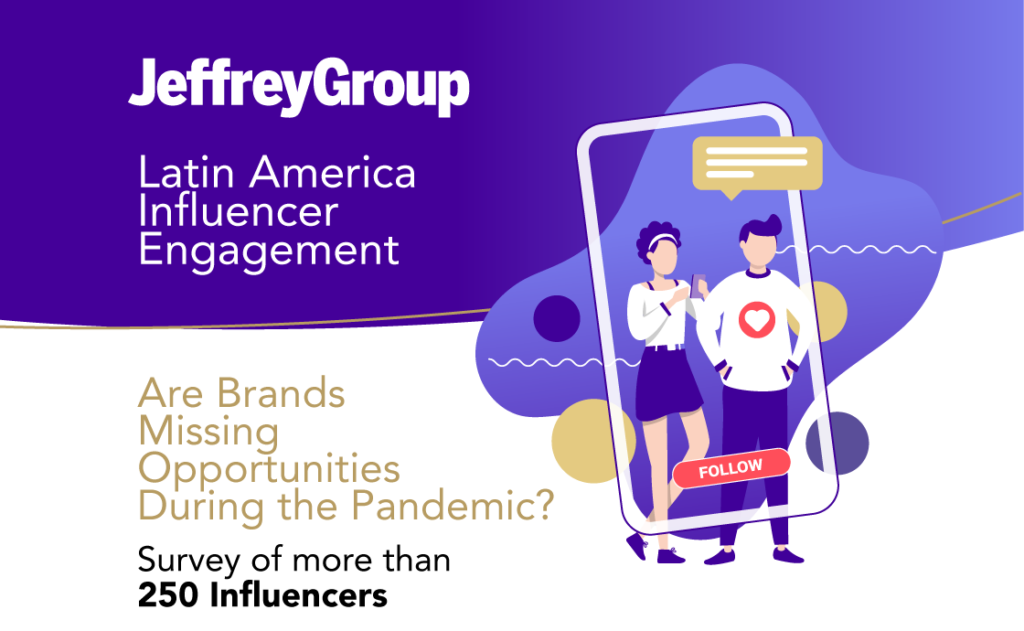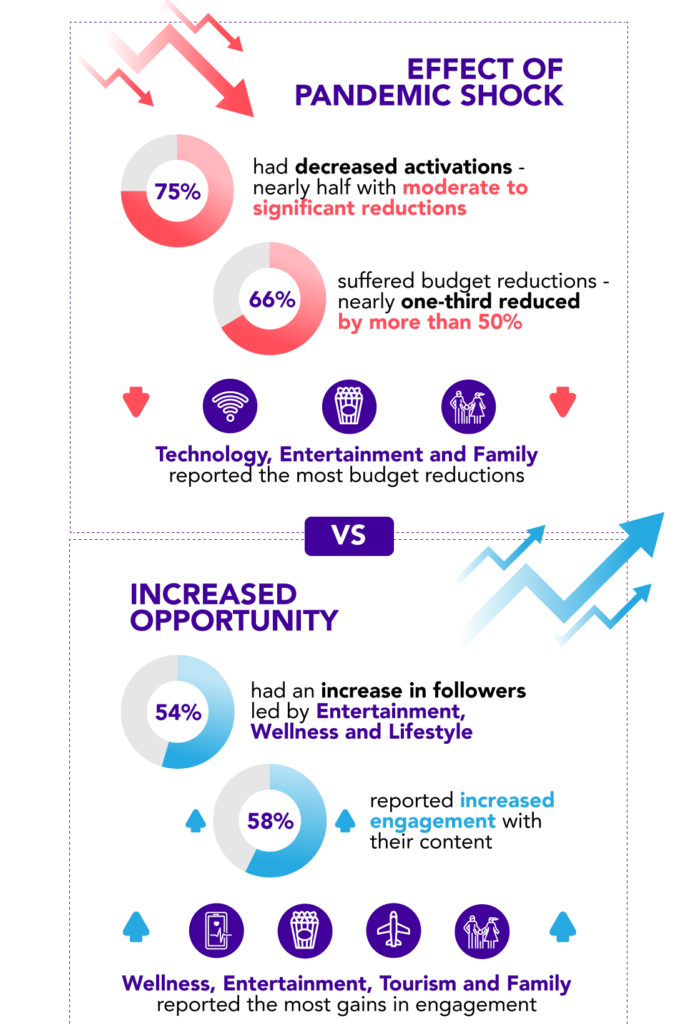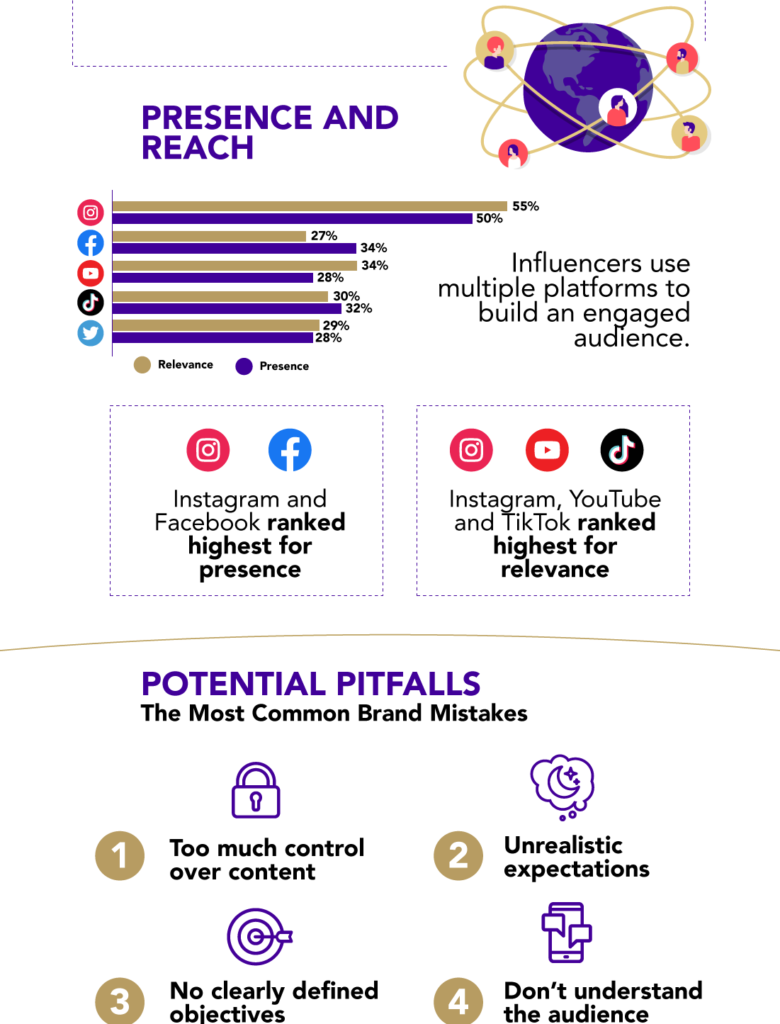JeffreyGroup Publishes Study on Brands’ Biggest Influencer Marketing Mistakes

JeffreyGroup, a public relations firm focused exclusively on Latin America, published a regional study that revealed the biggest mistakes brands make with their influencer marketing programs.

A survey of more than 250 social media influencers from across Latin America by the Insights and Analysis unit at JeffreyGroup showed that while Influencers in the region experienced increased engagement and larger audience counts during the pandemic, many brands were actually cutting back on brand activity and content generation. The study focused on a variety of content areas including Entertainment, Gaming, Lifestyle, Family, Sports, Technology, Tourism and Wellness to gain insight into the impact of the COVID-19 pandemic on the relationships between influencers and their brand partners, as well as their follower audiences.
The survey showed many brands reacted to the shock of the pandemic and quarantine conditions by cutting back on both the number of and investment in influencer activities, with 75% of respondents reporting a decrease in brand activations and nearly half (47%) experiencing moderate (>15%) to significant (>50%) reductions in brand activities.
The largest number of influencers reporting a decrease in activities came from the content areas of Family, Lifestyle and Entertainment. A smaller proportion (only 16%) of travel influencers reported significant (>50%) reduction in brand activities, which was an unexpected result considering the immediate and severe impact of the pandemic on revenue in the travel sector and the widespread travel restrictions that prevented the typical brand campaigns and promotions. “During post-survey interviews, some travel content producers revealed that their followers were focused on future travel opportunities, which is why the influencers continued to highlight experiences and exotic destinations in their content despite the pause in paid brand efforts” explained JeffreyGroup CEO Brian Burlingame.

Nearly two-thirds (66%) of the influencer respondents reported brand budget reductions, with 29% suffering reductions of more than 50%. The content areas of Technology, Entertainment and Family had the highest percentages of influencers reporting significant (>50%) reductions.
The drop-off in brand activities and budgets contrasts with the gains in followers and engagement reported by the influencers, with 54% of respondents experiencing an increase in their follower audiences and 58% reported increased engagement with content. In terms of the highest number of influencers reporting gains in followers, the Wellness category was the standout with 60% of the influencers reporting an audience increase and 27% reporting follower gains of more than 50%.
The majority of the influencers in the Lifestyle, Entertainment and Family categories – also experiencing the most brand pullback – reported at least moderate audience gains of 5% or more. “When compared with the decrease in brand activities and investment, the spikes in engagement and follower counts point to lost opportunities for brands,” Burlingame advised. “Brands could be leveraging the larger and more engaged audiences to fortify relationships, reach new consumers and drive consumer preference and loyalty.”
Overall, 58% of the respondents reported gains in engagement with their content. The Wellness category led with the most influencers (67%) reporting higher engagement from their followers, including nearly half experiencing engagement gains of 50% or more. The Wellness influencers were followed by respondents from the Entertainment and Tourism content areas with 64% reporting higher engagement, and Family influencers with 57%.

The influencer respondents were also asked about the type of content their audiences prefer in the context of the pandemic, with 78% reporting that their followers are looking for content unrelated to the pandemic, although 87% agreed that brand messaging should be authentic and empathetic to the current situation; and 92% confirmed that their followers want to be entertained and inspired in addition to being information. These responses indicate an overwhelming need for creative content that is relevant to each influencer’s audience and makes authentic brand connections.
The respondents also ranked the biggest mistakes brands make in their influencer engagement efforts, including: (1) trying to exert too much control over content; (2) having unrealistic expectations about the influencer program; (3) not having clearly defined objectives for their campaigns; and (4) having insufficient knowledge about or not understanding the audience.
Originally published by DossierNet.

